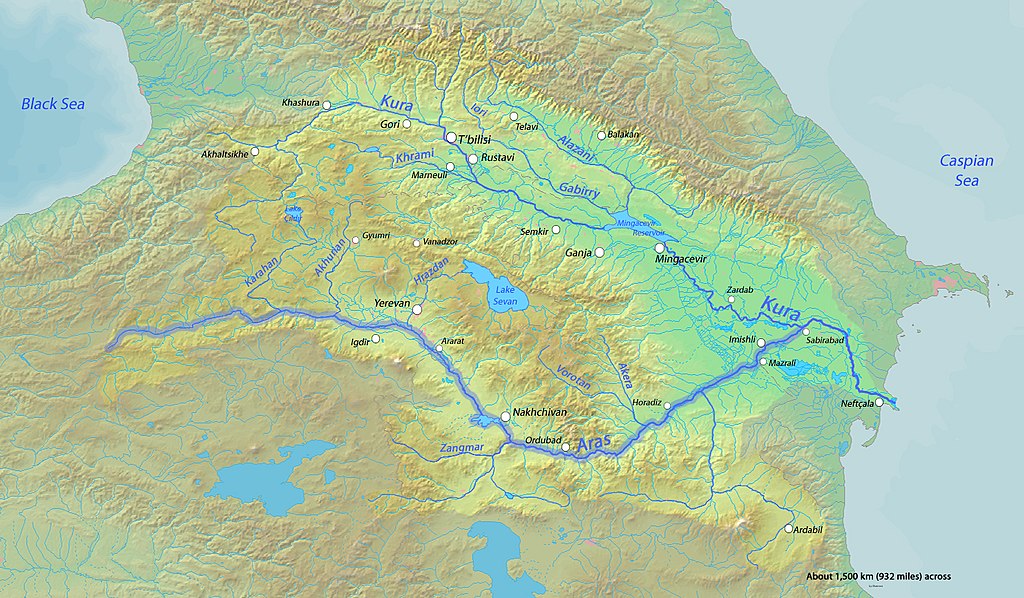Aran's name

According to Enayatullah Reza, the land that is now called the Republic of Azerbaijan was never called Azerbaijan until 1918.
(For more information, refer to the historical articles section and read Athurpatkan's article)
Once its old name was Albania. In the village of Buyuk Dekan, located in the Nokha part of the Caucasus, an inscription in ancient Greek language was found, which is dated to the 2nd century AD, and in which "Albania" is mentioned.
In the writings of ancient historians, including Plebius and Strabo, it is mentioned as "Albania". According to some researchers, Albania appears as "Jordan" in Parthian language sources. In the sources of the Islamic era, this name is written as Aran and "Alran".
This name is probably related to the name of the party "Erdan". Sometimes they mentioned this land with the two names of Aran and Sharvan. After the campaigns of Timur and the story of the Turkomans of Aqqoyunlu and Qaraqwinlu, the name of Aran was gradually removed from the books.
After the end of the Iran-Russia war and the annexation of this land to Russia in 1911, the Equality party was established in the present lands of the Republic of Azerbaijan. In March 1918, the equals organized an armed uprising in Baku, which soon spread to other areas. On May 27, 1918, they formed a government in Tbilisi and declared independence under the name "Azerbaijan Republic".
At the end of 1919 and the beginning of 1920, the Egalitarian government was subjected to a political and economic crisis. In the spring of 1919, the Soviet government was established in Maghan and Lankaran regions. On April 26, 1920, a temporary revolutionary committee was formed under the chairmanship of Nariman Narimanov.
On April 28, 1920, the Egalitarian government was overthrown and the Revolutionary Committee took power in Baku and called itself the government of "Azerbaijan Soviet Socialist Republic".
_and_Caucasus.jpg)
A map by Robert Kerr Porter in 1200 AD, which did not call the north of Aras River Azerbaijan.
Richard Fry says about the history of this capital: "The ancient name of the Republic of Azerbaijan is Albania, which the Arabs called Aran. This area has been the passageway for the migration of people and has been the place of battle between the Arabs, Khazars and Turks, and after the 11th century, the Turks ruled over this area.
Barthold says about the naming of Azerbaijan to Iran:
"The name Azerbaijan was chosen for the Republic of Azerbaijan because it was thought that with the establishment of the Republic of Azerbaijan, the Azerbaijan of Iran and the Republic of Azerbaijan would become one...; The name Azerbaijan was chosen in this regard.

Iran's official protest to the Ottoman Empire regarding the choice of the name "Azerbaijan" by the Equality Party for Aran
Whenever it is necessary to choose a name that can include the entire Republic of Azerbaijan, then the name of Aran can be chosen." Vladmir Meniorski says that this naming of the egalitarian government was done during the time of Nuri Pasha.
Mohammad Javad Mashkoor also wrote: "The state of Aran, which was known by this name in the Islamic era, was called Qarabag (Black Garden or Big Garden) from the time of the Turks Qaraqoyunlu and Aqqoyunlu until the First World War."
After the defeat of tsarist Russia, the people of that area claimed independence in September 1918 and formed a government called Azerbaijan under the influence of the Ottoman government.
The purpose of this naming was to take advantage of the weakness of the central government of Iran at the end of the Qajar period, to connect Iran's Azerbaijan, whose people spoke Turkish dialects like the people of Karabagh, with a fake Azerbaijan, and to form a government under Ottoman influence on both sides of the Aras River. But the Turks were soon defeated and the Ottoman Empire disintegrated.
Regarding the historical name of this land, Hamid Ahmadi writes:
"The current Republic of Azerbaijan means the former Soviet Azerbaijan, whose historical name is Aran, before the capture of this region during the Iran-Russian War (1812-1828 AD/1227-1243 AD) by Tsarist Russia was a part of Iran.
Iran, which in this period was better known as the Khanate of Shirvan, Ganja, Karabagh, etc., became the basis for the formation of an independent state called Azerbaijan after the October Revolution, but in 1920 AD / 1299 AD, the new Soviet Union forcibly annexed it. He annexed his land. It was after the fall of the Soviet Union in 1370/1991 AD that this land finally regained its independence.
According to Toraj Mariya, it was Stalin who decided to change the name of this region from Iran (known as Albania in ancient history) to Azerbaijan in order to interfere in Iran's affairs and make it a thorn in the eyes of Iran.
It is stated in the third chapter of the Golestan Agreement:
His Highness, the power of... Iran to prove the friendship... that they have with... the emperor of all the countries of Russia... the provinces of Karabagh and Ganja, which is now known as Belzatopol, and the provinces of Khanin Neshin, Sheki, Shirvan [Shervan], Qaba, Darband, Badkoba, and anywhere in the province of Talash. with the land that is now in the possession of the Russian government and the north of Dagestan and Georgia and Mahal Shure-Kol and Achugbash and Georgia and Mengril and Abkhaz and all the Ulka and the lands that were in the middle of the Caucasus and the borders of Mamin-al-Hala and also what is from the maritime lands of the Caucasus to the sea Caspian is connected, it is considered special and belongs to the countries of the Russian Empire.
Jalal Matini, based on this text from the Qajar era, rejects the term Azerbaijan for the area upstream of Aras.



